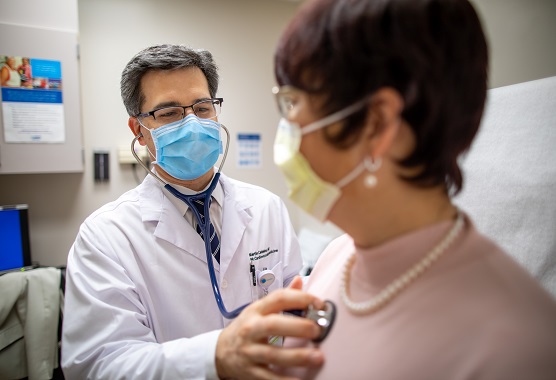Bicuspid Aortic Valve
Your heart is in good hands at UC Davis Health’s Structural Heart Disease Program. Our highly trained specialists diagnose and treat bicuspid aortic valves using the latest techniques.
Medically reviewed by Mimmie Kwong, M.D. on July 26, 2023.

Personalized Care for Your Heart
At UC Davis Health, we specialize in caring for structural heart diseases like BAV. You can rely on our highly trained team to find the right treatment for you, including heart valve repair and replacement.
What Is Bicuspid Aortic Valve (BAV)?
Your aortic valve allows blood to flow between your heart’s left ventricle and your aorta, which then delivers blood from your heart to the rest of your body.
Your aortic valve typically has three leaflets, or cusps, that open and close to allow your blood to flow normally. People with BAV were born with two leaflets instead of three.
These cusps may cause narrowing, or stenosis, of the valve. Another problem is that your valve may not seal properly, causing your blood to flow backwards. This may reduce blood flow to the rest of your body or cause blood to leak back into your left ventricle.
Symptoms of Bicuspid Aortic Valve
Symptoms of BAV can be mild or severe.
Common Symptoms in Adults
You may have some of the common symptoms of BAV, including:
- Chest pain
- A fast, fluttering heart rhythm
- A murmur or abnormal heart sound
- Difficulty breathing or feeling short of breath
- Feeling light-headed, dizzy or fainting
- Trouble walking, even for short distances
- Swelling in your feet or ankles
- Trouble sleeping, especially when lying flat
- Less than normal energy in performing your normal activities
Emergency Symptoms
You should call 911 immediately if you experience symptoms like:
- Chest pain or pressure
- Sharp, sudden pain in your chest or upper back
- Shortness of breath
- Trouble breathing or swallowing
Causes and Risk Factors of Bicuspid Aortic Valve
People with bicuspid aortic valve were born with an abnormal valve that has two leaflets instead of three. BAV is the most common structural heart issue you can be born with.
While we don’t know exactly what causes BAV, we know the risk factors that increase your chance of having BAV, including:
Family History
You face a greater risk for BAV if you have a family history of the condition or any aorta-related disease.
Biological Sex
Men have a higher risk for BAV than women.
Diagnosis and Testing for Bicuspid Aortic Valve
Your physician will start with a thorough physical evaluation. They may ask you about your medical history and symptoms. They may also listen to your heart for abnormal sounds called murmurs.
Your physician may confirm BAV using an echocardiogram. This test creates an image of your heart using high-frequency sound waves (ultrasound).
Your physician may also use imaging tests, such as a CT scan or MRI, to look inside your aortic sinuses.
In addition to these initial diagnostic tests, your physician will check your aortic valve and aorta on an ongoing basis.
Regular evaluations help catch when BAV is causing risky or even life-threatening complications, such as:
- Aortic aneurysms
- Endocarditis (infection of heart’s inner lining)
- Enlarged aorta
- Heart failure
- Weakening of your artery walls
Treatments for Bicuspid Aortic Valve
Our UC Davis Cardiac Surgery Division uses advanced techniques to provide you with optimal care in the least invasive manner.
Our team will assess the performance of your heart valve and associated structures like your aorta. This assessment helps them figure out which surgical treatment is the best option for you. They then work with you to develop an individualized treatment plan.
Aorta Replacement Surgery
Your physician may recommend surgery to replace part of your aorta.
Transcatheter Aortic Valve Replacement (TAVR)
TAVR is an alternative to open heart surgery. It uses a catheter to insert a new aortic valve in your heart.
Aortic Valve Replacement Surgery
Your physician may recommend surgery to replace your damaged aortic valve using either a mechanical or tissue valve.
- Mechanical valve: This is an artificial long-lasting valve made of durable materials like carbon.
- Tissue valve: This is a new valve retrieved from a human donor or made from animal tissue.
Which sex is more likely to develop BAV?
1-2%More common in men
Source: Centers for Disease Control and Prevention (CDC): Valvular Heart Disease
Request an Appointment
As Sacramento's No. 1 hospital, you'll benefit from unique advantages in primary care and specialty care. This includes prevention, diagnosis and treatment options from experts in 150 specialties.
Referring Physicians
To refer a patient, submit an electronic referral form or call.
800-4-UCDAVIS
Patients
Call to make an appointment.
Consumer Resource Center
800-2-UCDAVIS

Ranked among the nation’s best hospitals
A U.S. News & World Report best hospital in cardiology, heart & vascular surgery, diabetes & endocrinology, ENT, geriatrics, neurology & neurosurgery, and pulmonology & lung surgery.

Ranked among the nation’s best children’s hospitals
U.S. News & World Report ranked UC Davis Children’s Hospital among the best in pediatric nephrology, orthopedics*, and pulmonology & lung surgery. (*Together with Shriners Children’s Northern California)

Ranked Sacramento’s #1 hospital
Ranked Sacramento’s #1 hospital by U.S. News, and high-performing in aortic valve surgery, back surgery (spinal fusion), COPD, colon cancer surgery, diabetes, gynecological cancer surgery, heart arrhythmia, heart failure, kidney failure, leukemia, lymphoma & myeloma, lung cancer surgery, pacemaker implantation, pneumonia, prostate cancer surgery, stroke, TAVR, cancer, orthopedics, gastroenterology & GI surgery, and urology.

The nation’s highest nursing honor
UC Davis Medical Center has received Magnet® recognition, the nation’s highest honor for nursing excellence.

World-class cancer care
One of ~59 U.S. cancer centers designated “comprehensive” by the National Cancer Institute.

A leader in health care equality
For the 13th consecutive year, UC Davis Medical Center has been recognized as an LGBTQ+ Healthcare Equality Leader by the educational arm of America’s largest civil rights organization.

